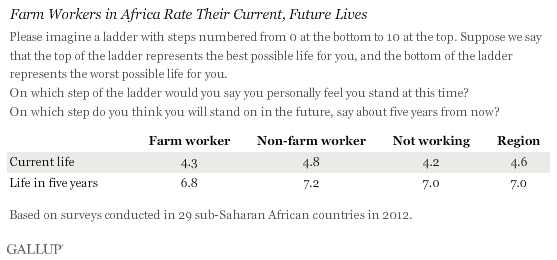This is the third in a series of articles about agricultural workers in sub-Saharan Africa to coincide with the United Nations International Year of Family Farming.
WASHINGTON, D.C. -- Farm workers living in Africa rate their current and futures lives worse than non-farm workers in the region, which is not wholly unexpected given their low household income. But their ratings are just as pessimistic, if not more so, than those who are not working.

These results are based on nationally representative face-to-face Gallup World Poll surveys in 29 countries in sub-Saharan Africa conducted in 2012. Respondents who said they were employed for an employer or reported being self-employed were asked to provide their general job type. Those who identified themselves as farmers, farm workers, aquaculture or hatchery workers, fishermen, deck hands on a fishing boat, lumberjacks, or forest management workers were asked a follow-up question, "Do you work on a farm? That is, a place that grows crops or raises livestock, poultry, or fish?" Gallup classified those who answered "yes" to this question as farm workers. It is important to note that the estimates of the size of the farm worker population are not estimates of the farm labor force because the data include all adults and do not exclude adults who would be omitted in labor force estimates.
The negative experiences many farm workers are having on a daily basis may help to explain their lower life ratings. Gallup measures negative experiences in these countries by asking people whether they experienced pain, worry, sadness, stress, and anger the day before the survey. Gallup compiles the "yes" responses into a Negative Experience Index, a measure of their negative experiences. With a Negative Experience Index score of 26, more farm workers are having these negative experiences than non-farm workers (23) and those who are not working (23).

At the same time, farm workers are also less likely to be having positive experiences. Gallup measures positive experiences by asking people whether they experienced enjoyment a lot, felt respected, felt well-rested, laughed and smiled a lot, and learned or did something interesting the previous day. Gallup compiles the "yes" results into a Positive Experience Index score for each country. With a maximum of 100 points, the higher the score, the higher the positive emotions in a country. Across all countries, the Positive Experience Index is 70. Farm workers have a significantly lower scores (66) compared with non-farm workers (70) and nonworking adults (71).
Bottom Line
The poor life ratings, lower incidence of positive experiences, and higher incidence of negative experiences reinforce how difficult life is for farm workers living in Africa. If GDP continues to grow in sub-Saharan Africa, it is possible there will be a trickle-down effect to farm workers large enough to encourage measurable improvements in their well-being.
For complete data sets or custom research from the more than 150 countries Gallup continually surveys, please contact us.
Survey Methods
Results are based on face-to-face interviews with 30,999 adults in Angola, Benin, Botswana, Burkina Faso, Cameroon, Chad, Comoros, Congo Brazzaville, Congo Kinshasa, Ethiopia, Gabon, Ghana, Guinea, Kenya, Madagascar, Malawi, Mali, Mauritania, Niger, Nigeria, Rwanda, Senegal, Somaliland, South Africa, Sudan, Tanzania, Uganda, Zambia, and Zimbabwe, aged 15 and older. All surveys were conducted between February and December 2012 in each country.
The margin of error is ±0.1 for overall life evaluation and life evaluation in five years and is 0.8 for the overall Positive and Negative Experience indexes.
For more complete methodology and specific survey dates, please review Gallup's Country Data Set details.
